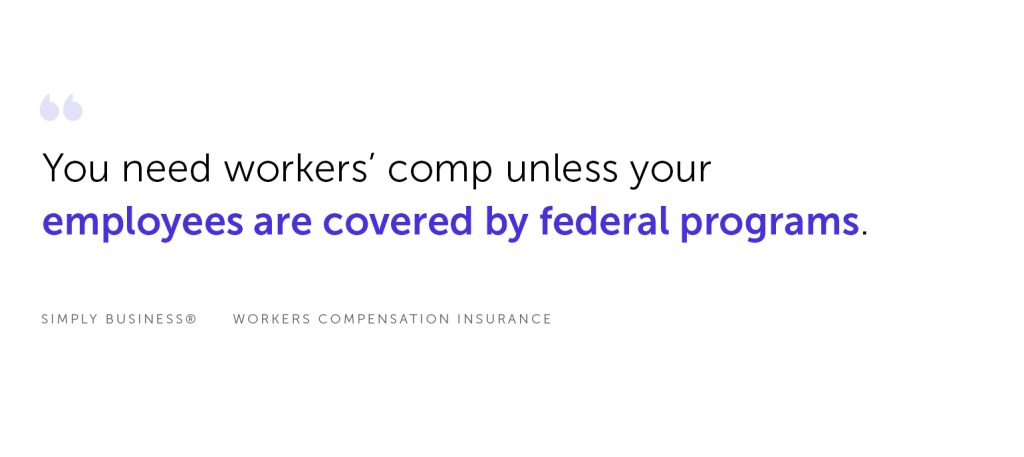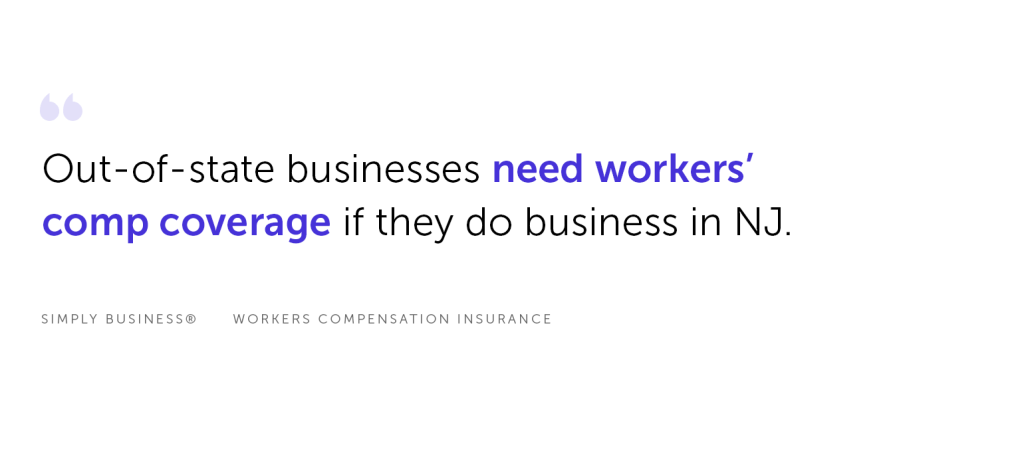New Jersey Workers’ Compensation Insurance
Our guide to workmans comp insurance NJ rules for small business owners in the Garden State. Click the button below to compare quotes.
Simply Business is pleased to provide tailored insurance options from:
If you’re a resident of New Jersey (or someone who pays a lot of attention to license plates), you probably know New Jersey is called the “Garden State.” But more than fruits and vegetables have taken root in New Jersey — small businesses have sprouted up as well.
If you happen to be a small business owner in New Jersey (or if you’re planning to be), you might want to know a bit of information about workers’ compensation insurance requirements in the Garden State.
If so, you’re in the right place.

Is Workers Comp Insurance Required in New Jersey?
Yes, workers’ comp is required for all employers in New Jersey. According to the New Jersey Department of Labor and Workforce Development website, unless your employees are covered by federal programs, you need to purchase workers’ comp coverage or be approved for self-insurance.
Even if you’re an employer not based in N.J., you’ll need workers’ comp coverage if you do business in the state including, but not limited to, corporations, LLCs, partnerships, and sole proprietors.
Do I Need NJ Workers’ Compensation Insurance?
If you have employees in New Jersey, you need to have workers’ compensation insurance. This does not apply to unpaid interns, unpaid volunteers, independent contractors, or sole proprietors with no employees.
Along with staying on the right side of the law, there can be other benefits to having workers’ comp insurance.
1. It can protect your business’s finances in the event a claim is filed.
If one of your workers gets injured or sick while on the job, you could be sued. That’s why most workers’ comp insurance policies include employee’s liability insurance.
If an employee claims that your negligence directly resulted in the accident or illness, your employer’s liability coverage may cover costs related to:
- Attorney’s fees
- Claim payouts
- And more
Keep in mind that the above is subject to your employers liability coverage’s limits.
2. It can prevent your business from being wiped out by a catastrophic claim.
The medical and rehab costs we just mentioned can add up. The amounts can vary, depending on the type of illness or injury, but as recently as 2019, workers’ comp the cost of workers’ comp injuries was $171 million, and the average cost of an injury was $42,000.
That could be quite a blow to your small business. On top of that, there could be additional costs if you have to replace an employee whose injury or illness keeps them out of work for an extended period of time.
3. It can pay for legal fees if you need to defend yourself against a lawsuit.
Medical expenses and treatment aren’t the only big-ticket expenses you might have to face if one of your workers gets hurt on the job. Attorney’s fees, court costs, and any settlement also may come out of your pocket if you don’t have workers’ compensation coverage.
4. It can build trust with your employees.
Finding and hiring good people isn’t easy. It can take time away from other parts of running your business, and it may even keep you from having the resources or workforce needed to stay competitive.
So when you have a valuable employee, you want to do everything you can to make them feel valued. Knowing there’s workers’ comp coverage in place can help them feel more secure, knowing that they’ll be taken care of if they get sick or hurt on the job.

How Much is NJ Workers’ Compensation Insurance?
Generally, the amount you’ll pay for workers’ comp insurance in any state is determined by several factors. They include the type of work you do, the size of your payroll, your claims history, and the state in which you operate.
Let’s take a look at each of them.
1. The type of work you do.
Risk to workers varies, based on the type of work they perform. For example, a roofer is more at risk for physical injury than an accountant. That’s why construction companies and others that are riskier for employees generally will pay higher premiums.
2. Your payroll size.
How much you pay your employees also plays a role in the cost of your workers’ comp insurance. There is a rate/$100 of payroll that varies by state.
3. Your claims history.
This is less of a concern if you’re just starting a business in New Jersey, but your history of workers’ comp claims also will affect the premium your business pays for coverage. Insurers look at both the number of claims and the seriousness of each claim to calculate your premium.
4. Your state.
As we mentioned earlier, each state has its own laws regarding workers’ compensation, and they often extend to the rate/$100 of payroll and are based on the job classification of each employee.
Employee job classifications refer to the type of job an employee performs and the risk associated with it. Office workers would be considered low-risk, whereas paramedics are considered high-risk.
Many states set workers’ compensation rates, based on the Scopes Manual from the National Council on Compensation Insurance (NCCI). They maintain hundreds of class codes for workers’ comp, describing each job type’s level of risk to help determine an appropriate rate.
Here’s a simplified explanation of how all these factors come together in determining the workers’ comp rate in each state:
Payroll (per $100) X Class Code Rate X Experience Modifier (if applicable) + State Taxes & Fees = Premium

Workers’ Compensation for the Self-Employed in N.J.
If you run a business and have no employees, you’re generally not required to have workers’ compensation coverage in New Jersey. However, there are some reasons to consider getting a workers’ comp policy for yourself. We cover those and other helpful information in this article.
Penalty for Not Having Workers’ Compensation Insurance in N.J.
In New Jersey, the penalties for not having coverage can add up by the day. The penalty can be as high as $5,000 for the first 10 days and up to $5,000 for each additional 10-day period without coverage. There also are penalties for workers’ compensation fraud. You could face up to 18 months in jail and a $10,000 fine in addition to civil penalties.


We’re Here to Help with Your New Jersey Workers’ Compensation Insurance
By now, you probably realize that if you have employees in New Jersey, you need workers’ comp insurance.
What you may not realize is that getting workers’ comp coverage doesn’t have to be complicated, time-consuming, or frustrating. That’s why we’re here.
We’re small business insurance specialists. We know a lot about workers’ comp, and we understand a lot about being a small business owner. We work with tens of thousands of them across the U.S.
Want a fast quote for workers’ comp coverage for your business? Check out our online quote tool. Just provide some information about your business, and we’ll take it from there. You can get a quote and get covered in just minutes, 24/7, on your phone, laptop, or tablet.
Got questions about workers’ comp insurance? We’re here for that as well. Our licensed insurance pros will be glad to talk with you, give you the information you need, and get your business covered all on the phone. Just call 855-930-2844, Monday-Friday, 8 a.m.-8 p.m. ET.
NJ Workers’ Compensation Insurance Rates
Class code rates change each year in New Jersey. They are set by the New Jersey Compensation Rating and Inspection Bureau (NJCRIB).
Among the Bureau’s responsibilities are to “establish and maintain rules, regulations and premium rates for workers compensation and employers liability insurance.”
You can find more information about current New Jersey class code rates on their website.
Workers’ Compensation Insurance for Independent Contractors in New Jersey
As we mentioned at the beginning of this article, employers aren’t required to have workers’ compensation coverage for independent contractors. However, it’s important to understand the definition of an independent contractor in New Jersey.
The state uses The ABC Test to determine if a worker is an independent contractor. According to the Department of Labor and Workforce Development, a worker is considered an independent contractor in New Jersey if all the following circumstances (A,B,C) apply:
A. “The individual has been and will continue to be free from control or direction over the performance of work performed, both under contract of service and in fact; and
B. The work is either outside the usual course of the business for which such service is performed, or the work is performed outside of all the places of business of the enterprise for which such service is performed; and
C. The individual is customarily engaged in an independently established trade, occupation, profession or business.”
If you misclassify an employee as an independent contractor, you run the risk of the penalties mentioned above.
Growing Your Business in the Garden State
If you’re hiring employees, it’s usually a sign that your business is growing and you’re doing things right. It also can present new risks for your business as well. Getting workers’ compensation insurance in New Jersey is one way to make sure you’re complying with state law, financially protecting your business, and taking care of your employees.
For more information on workers’ comp, as well as insight, advice, and business tools, visit our small business online resource center, Simply U.